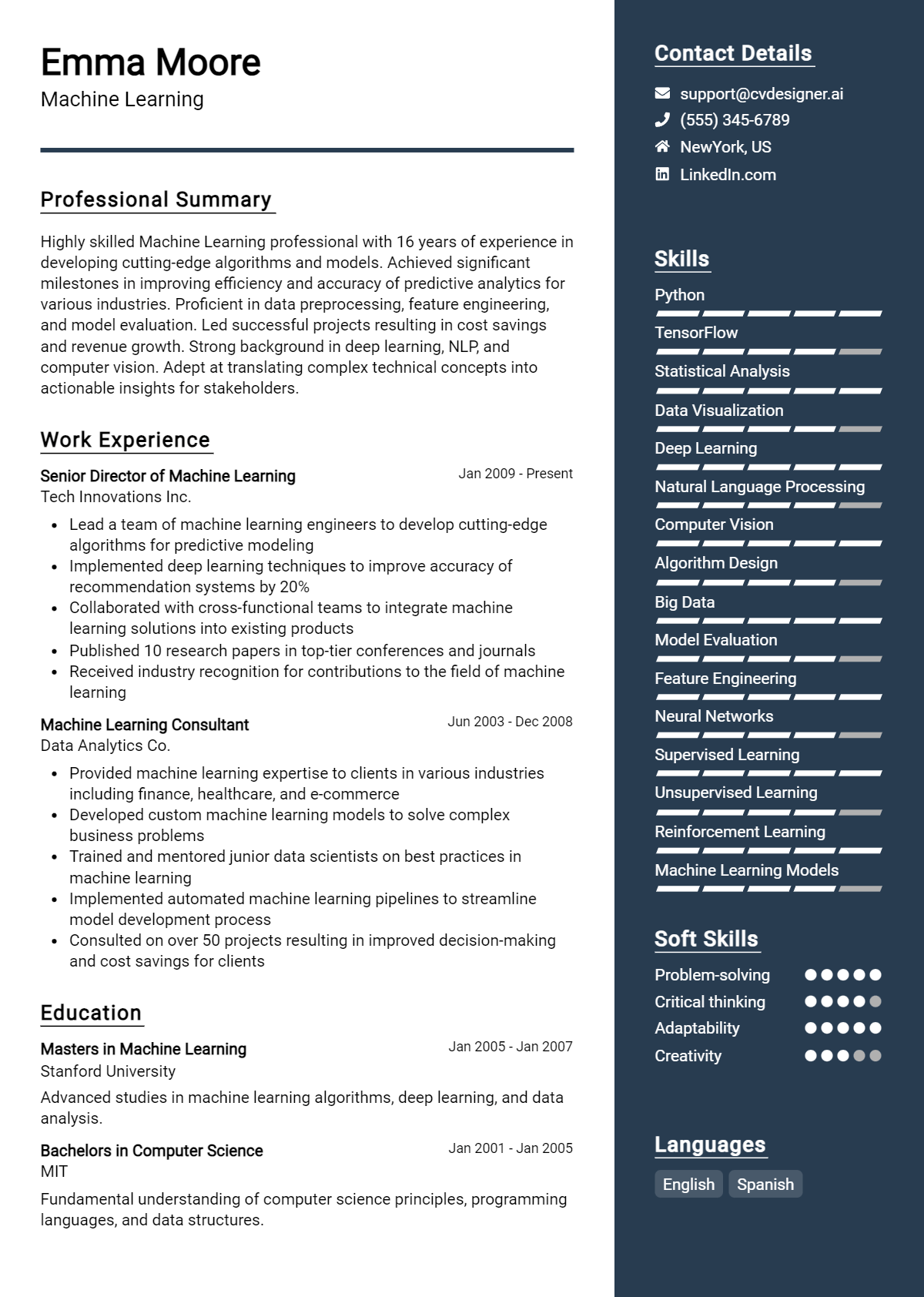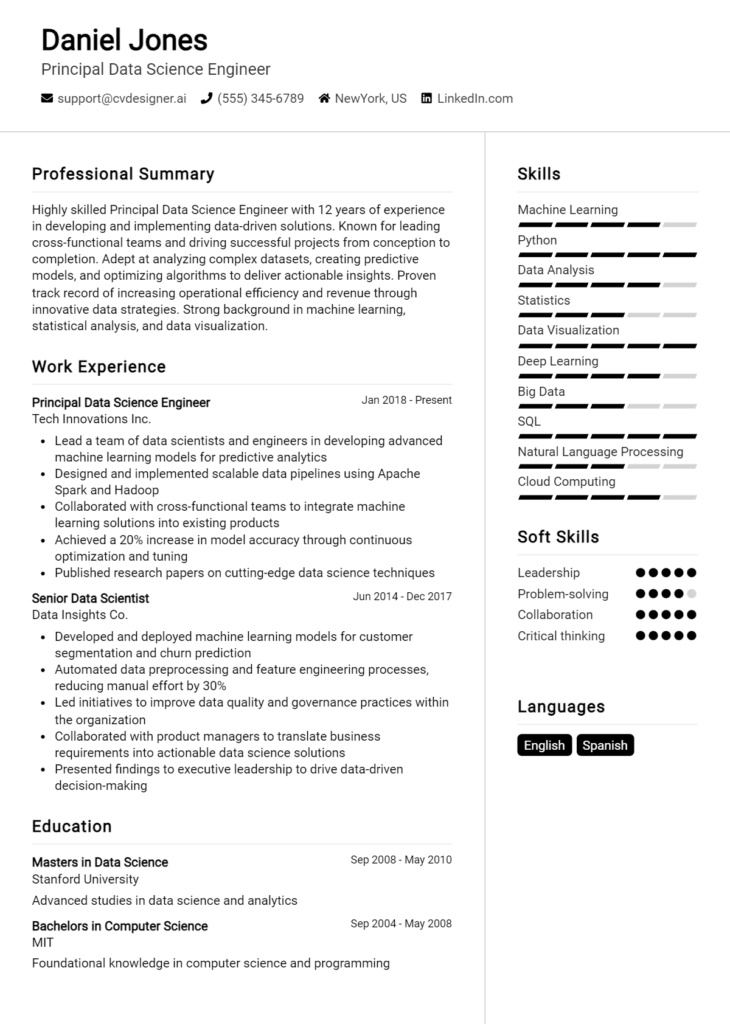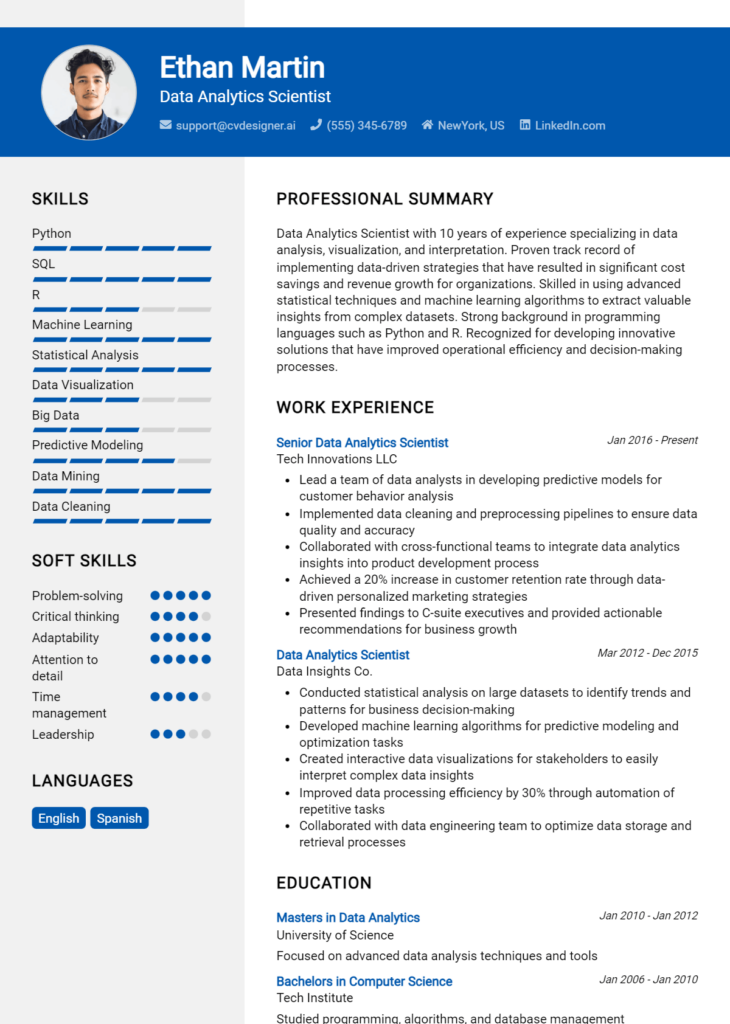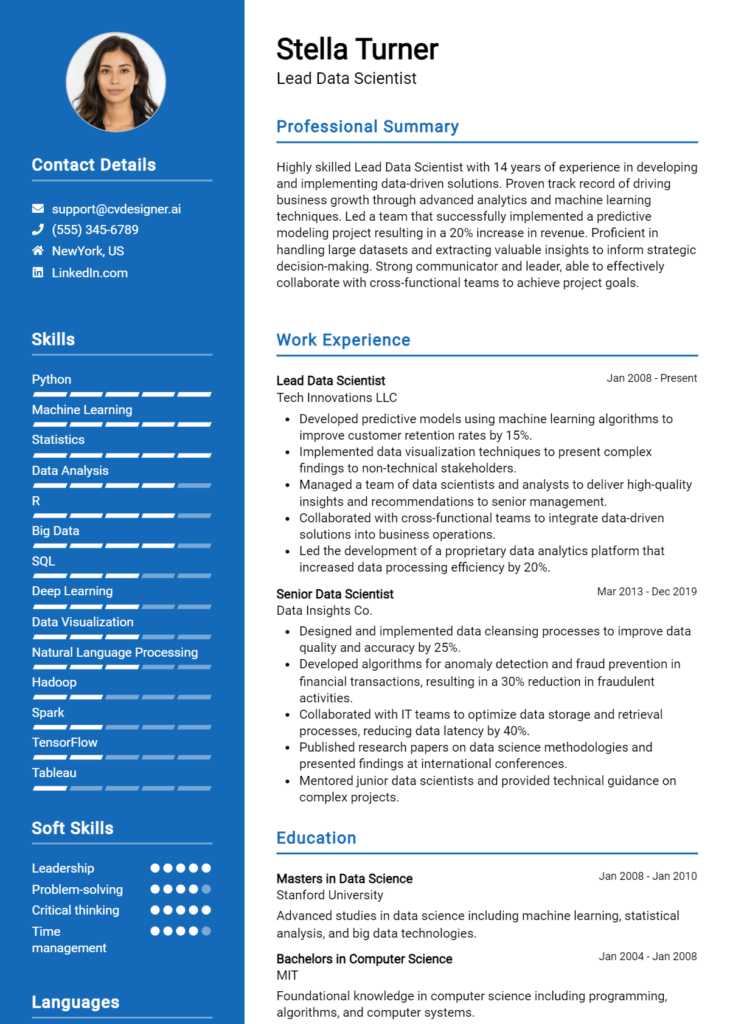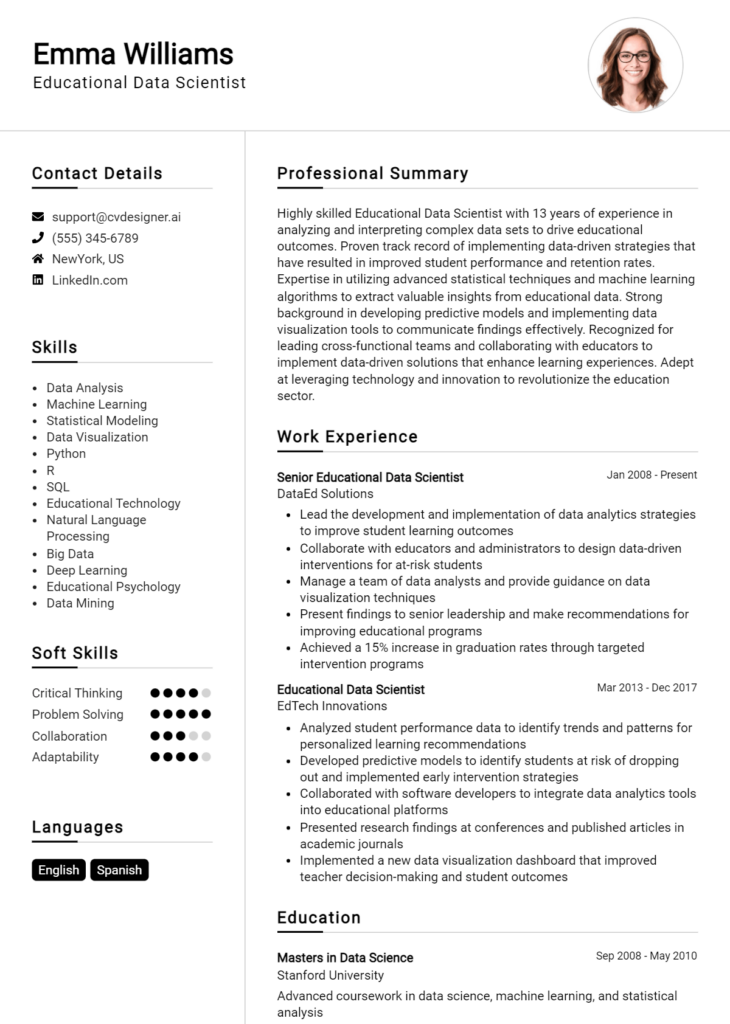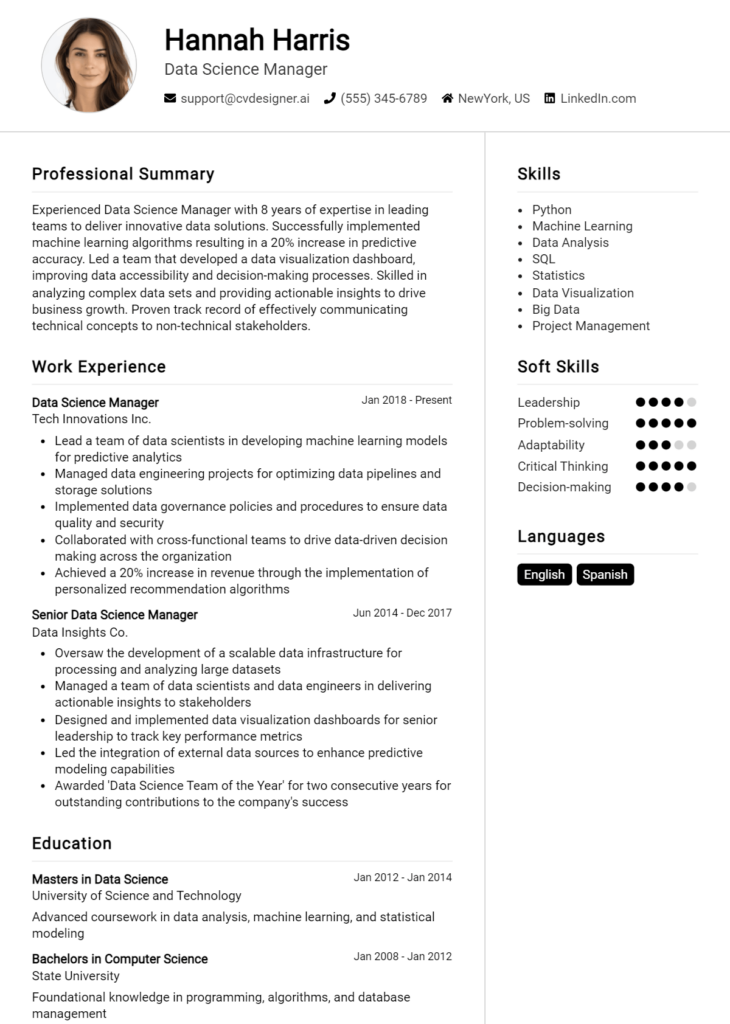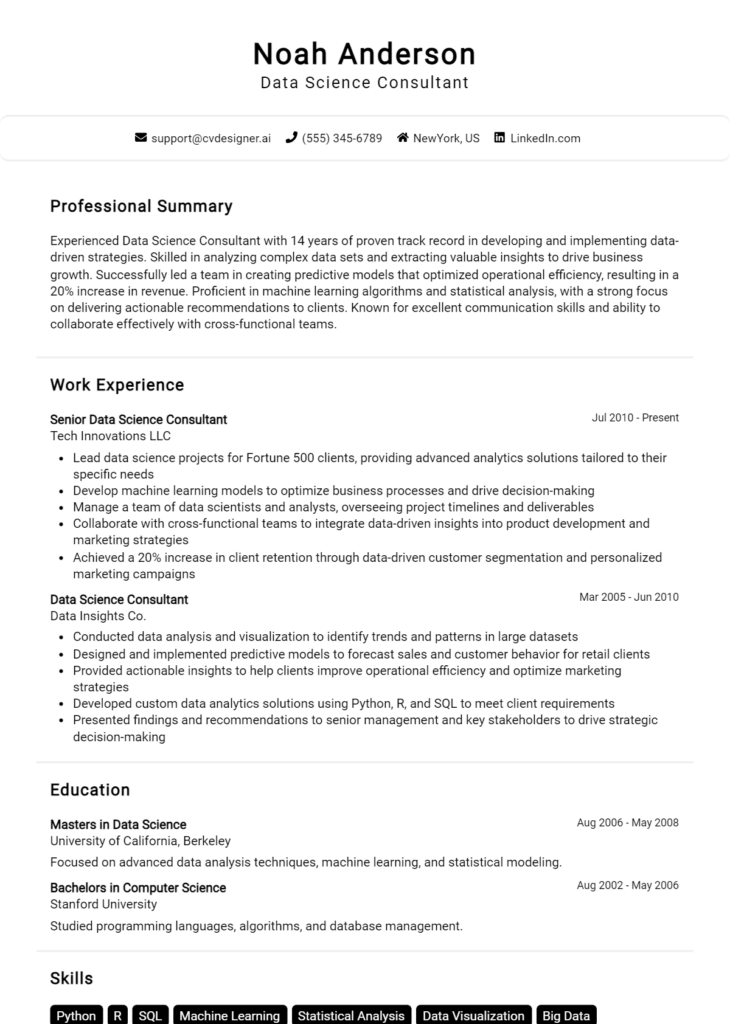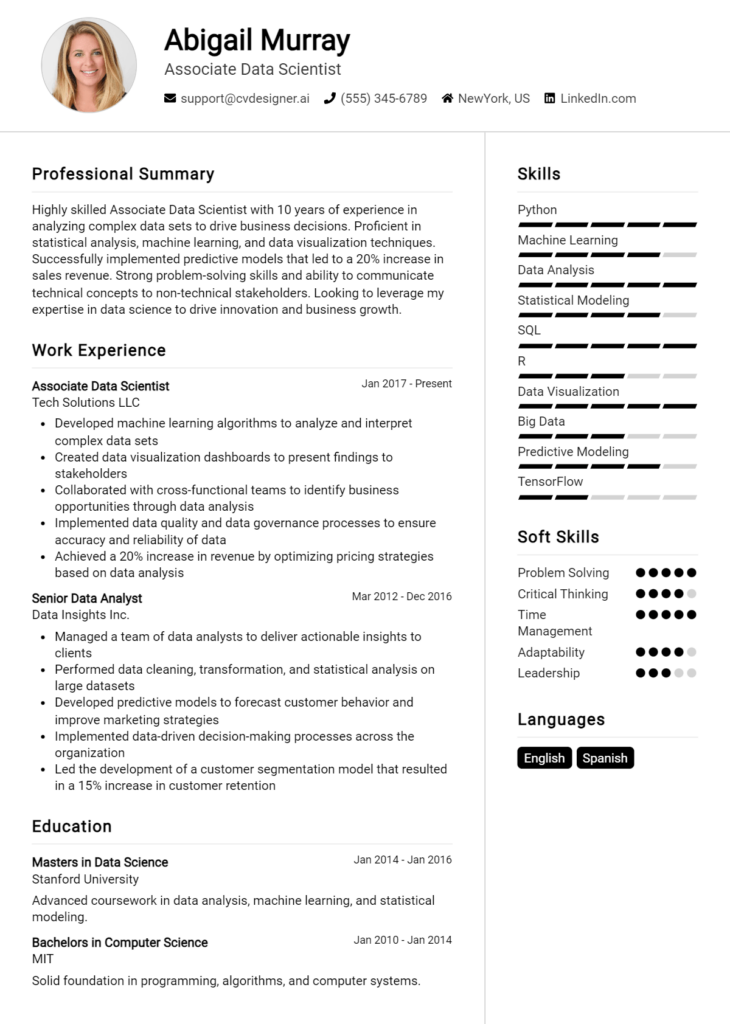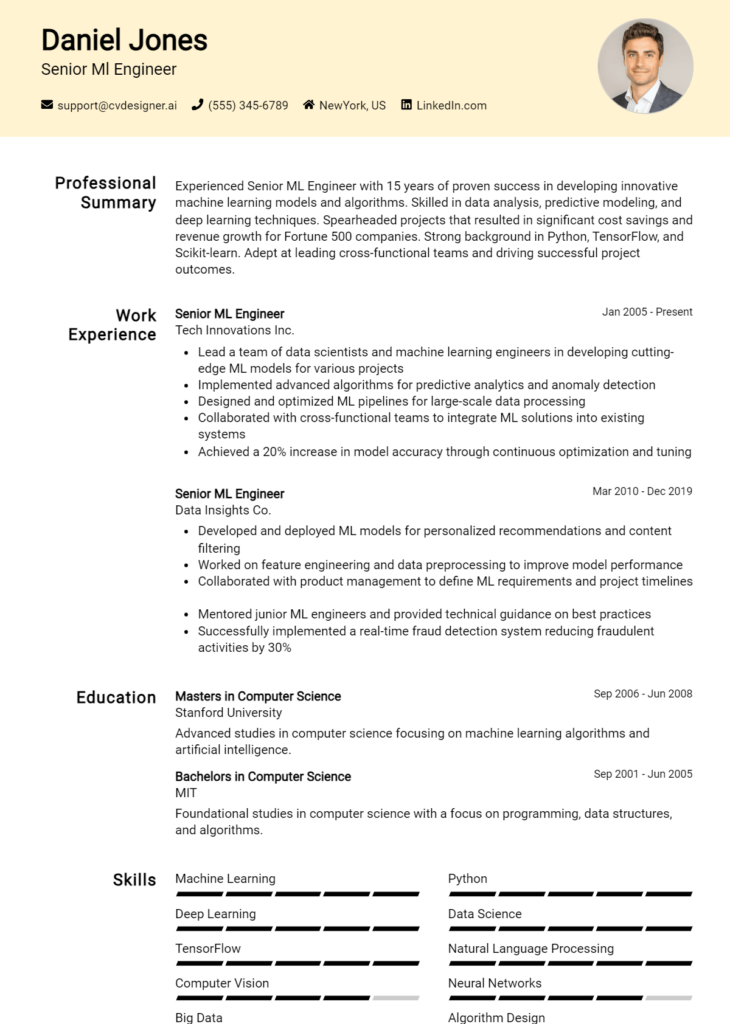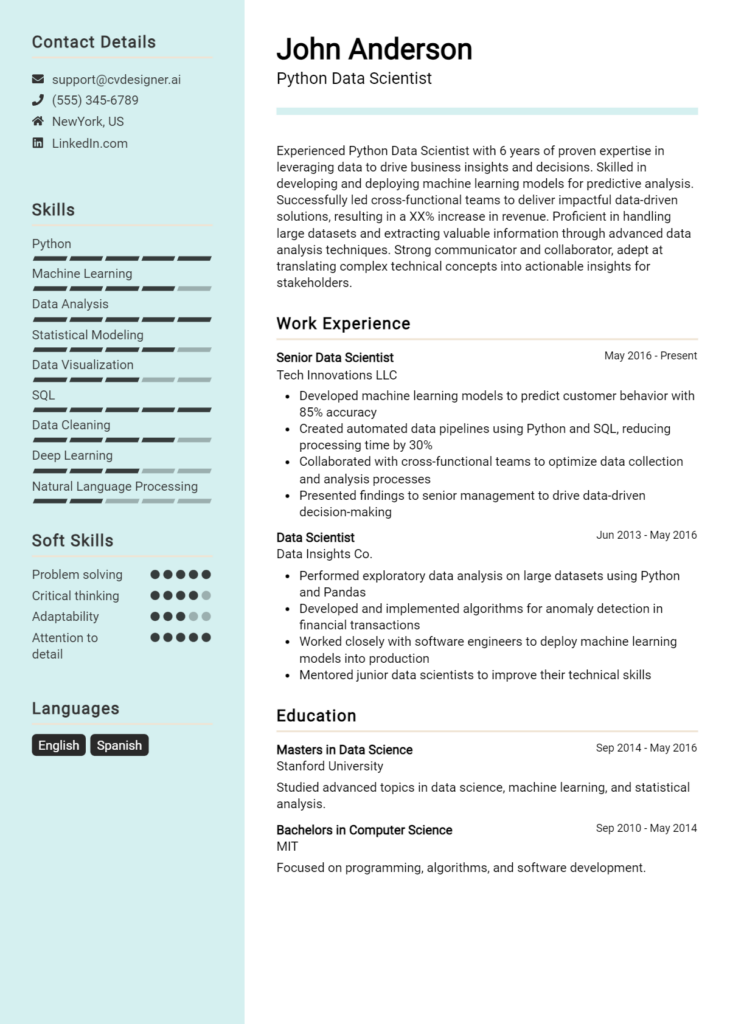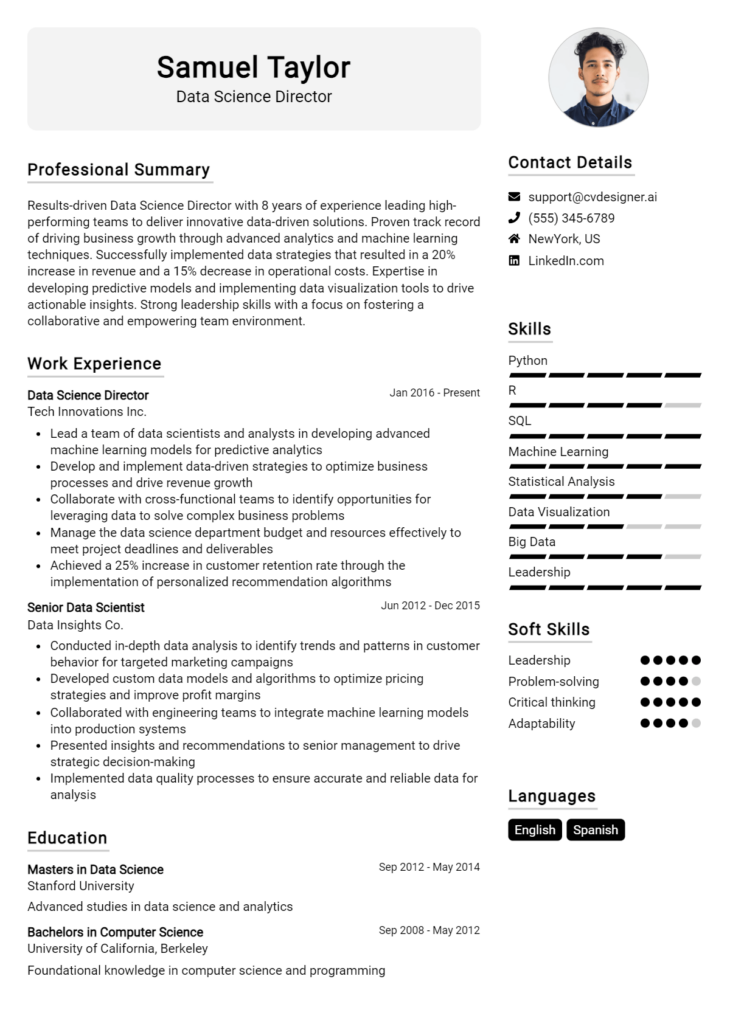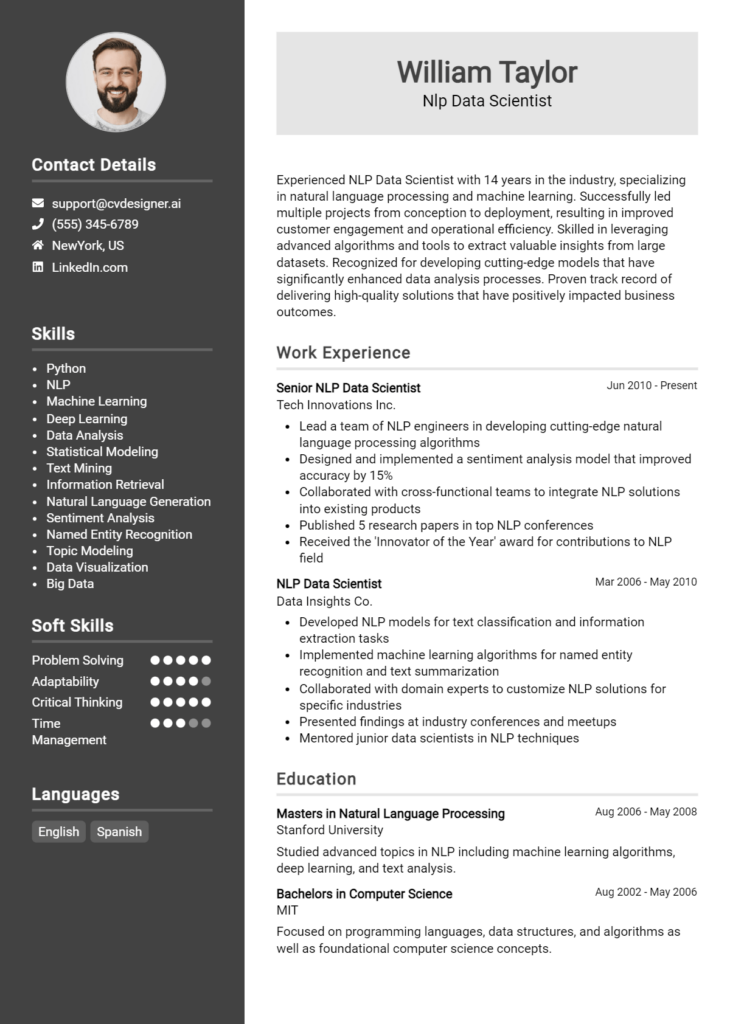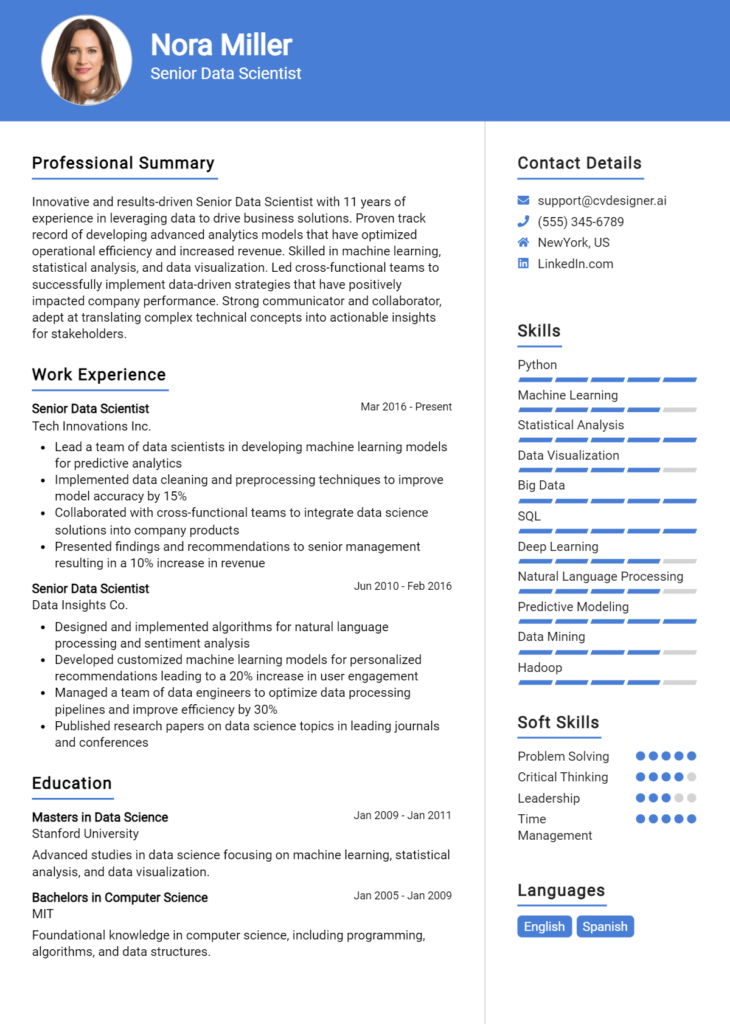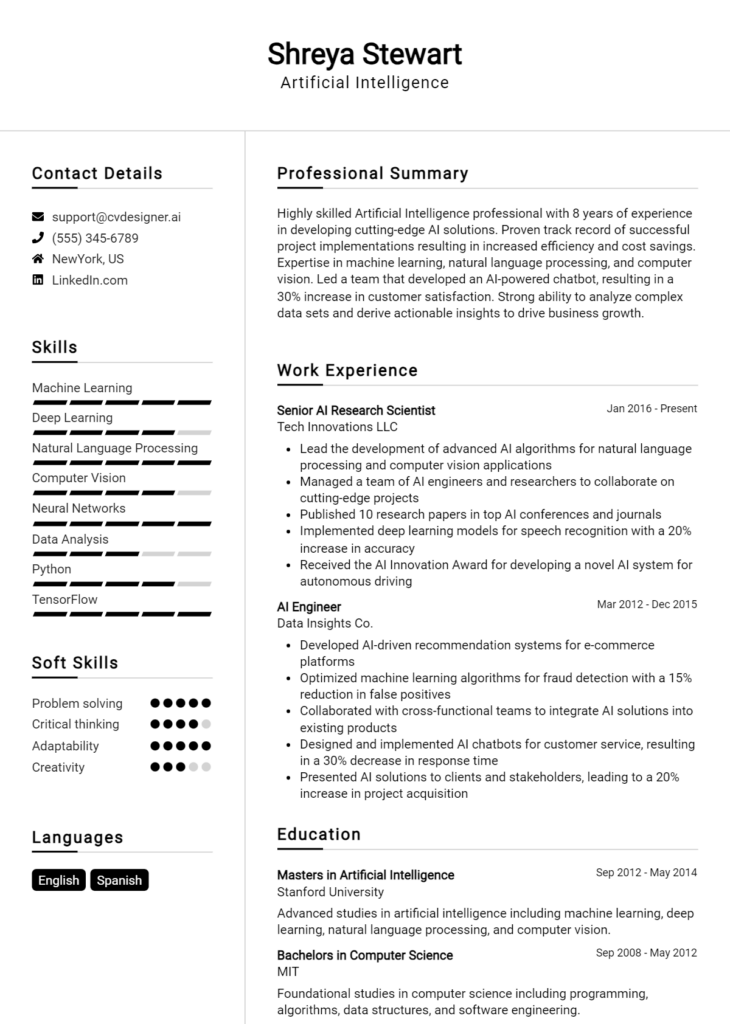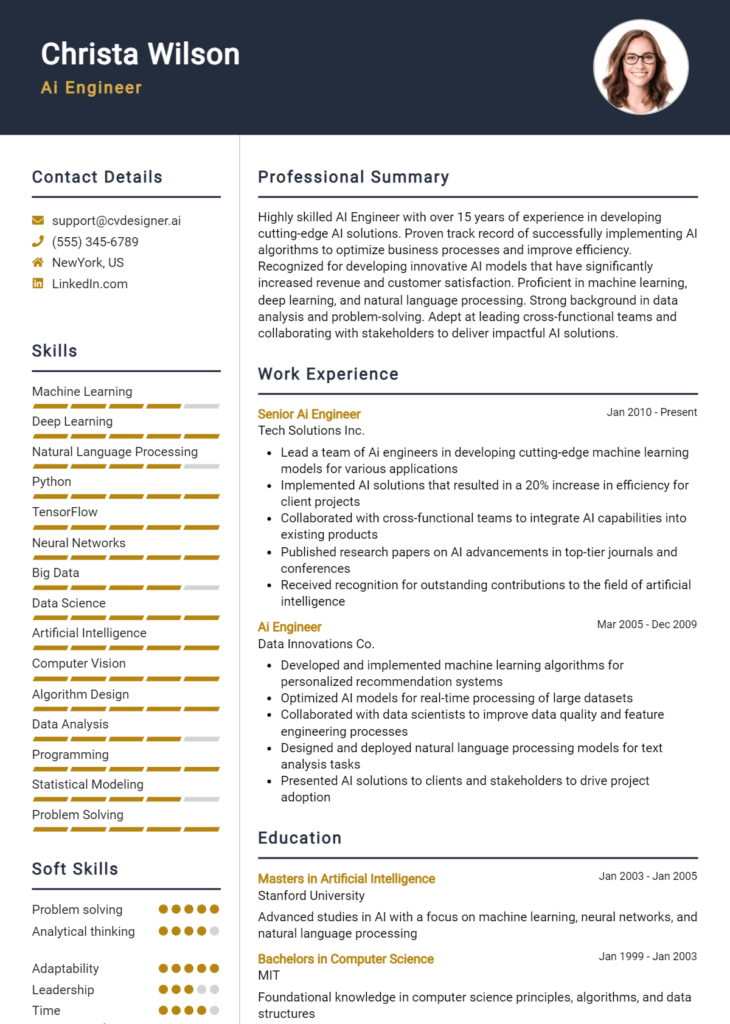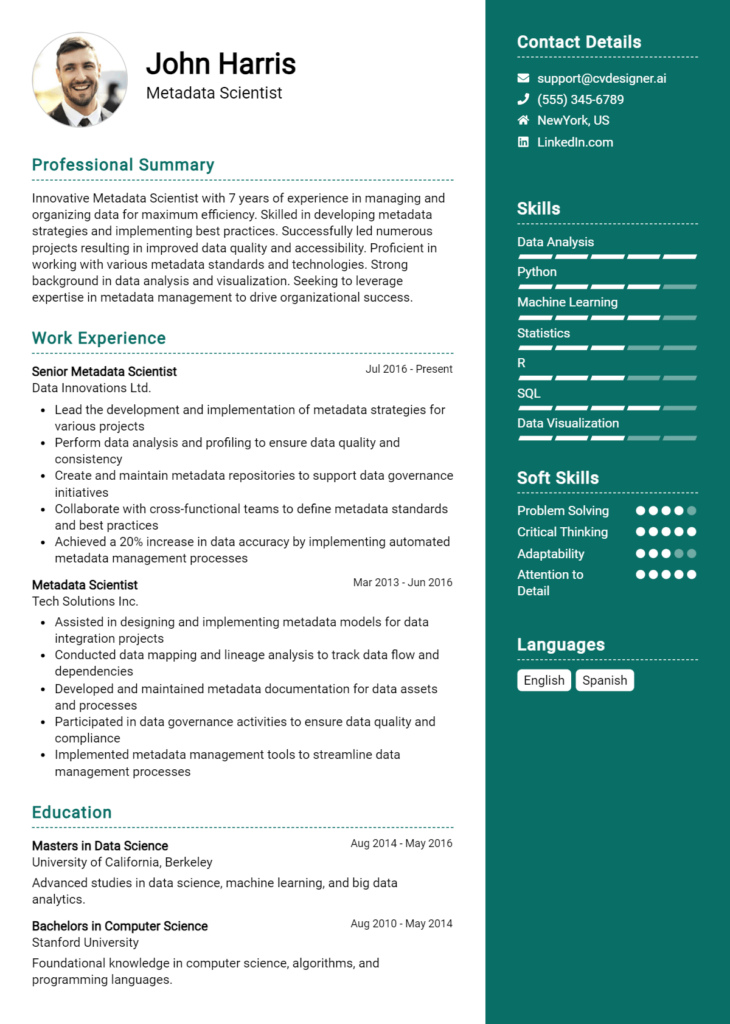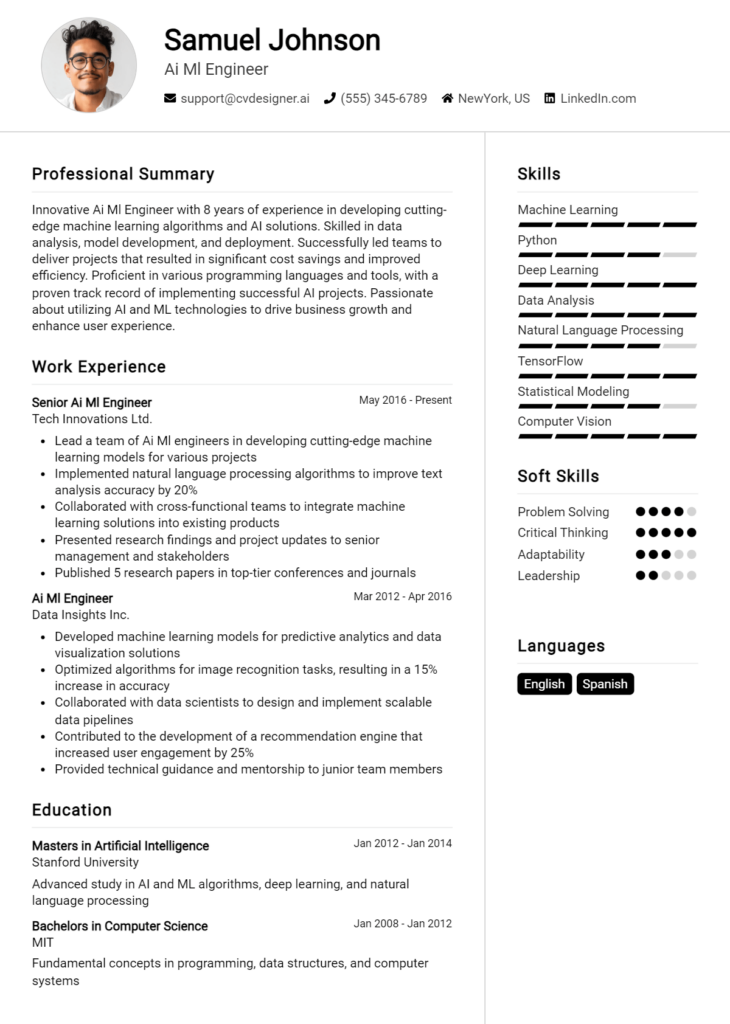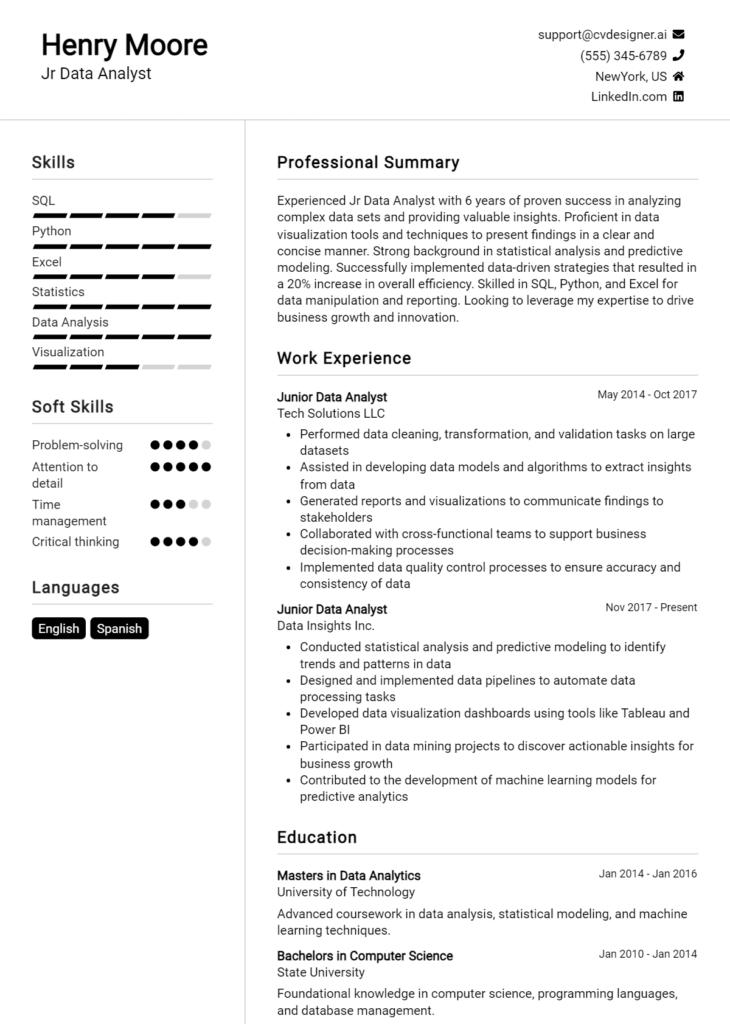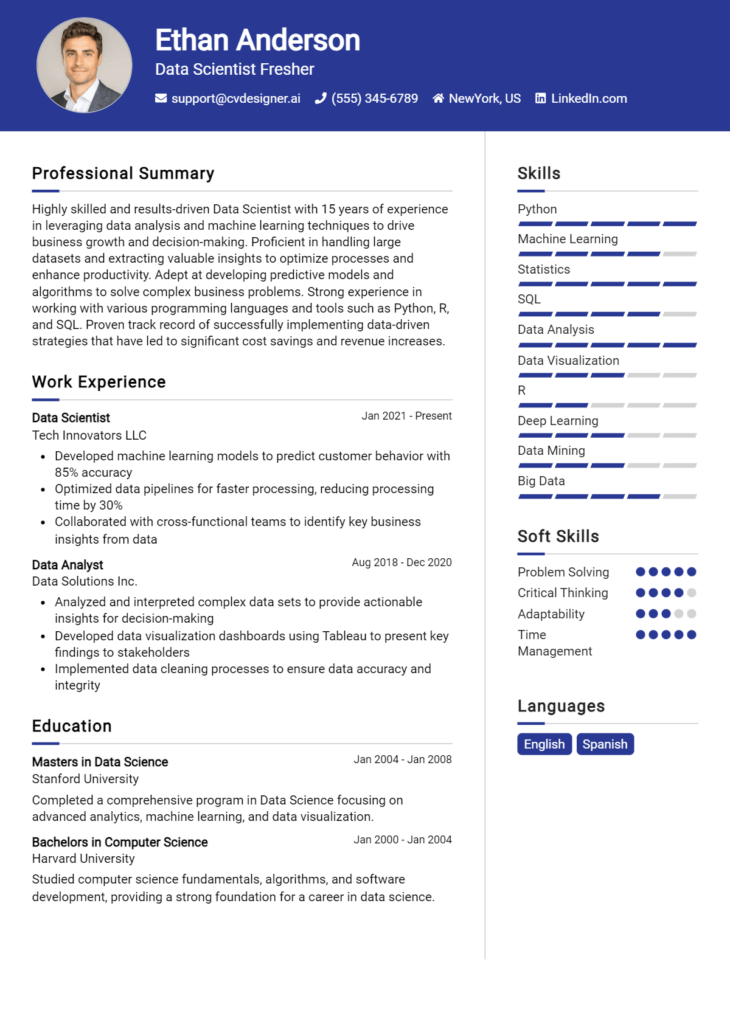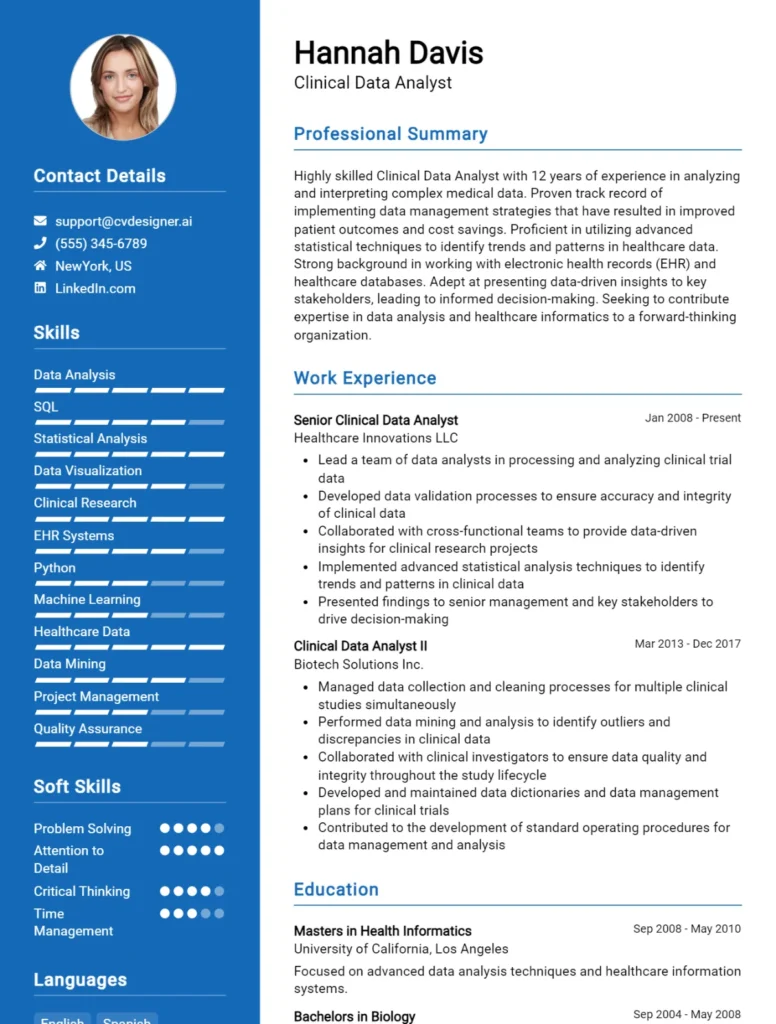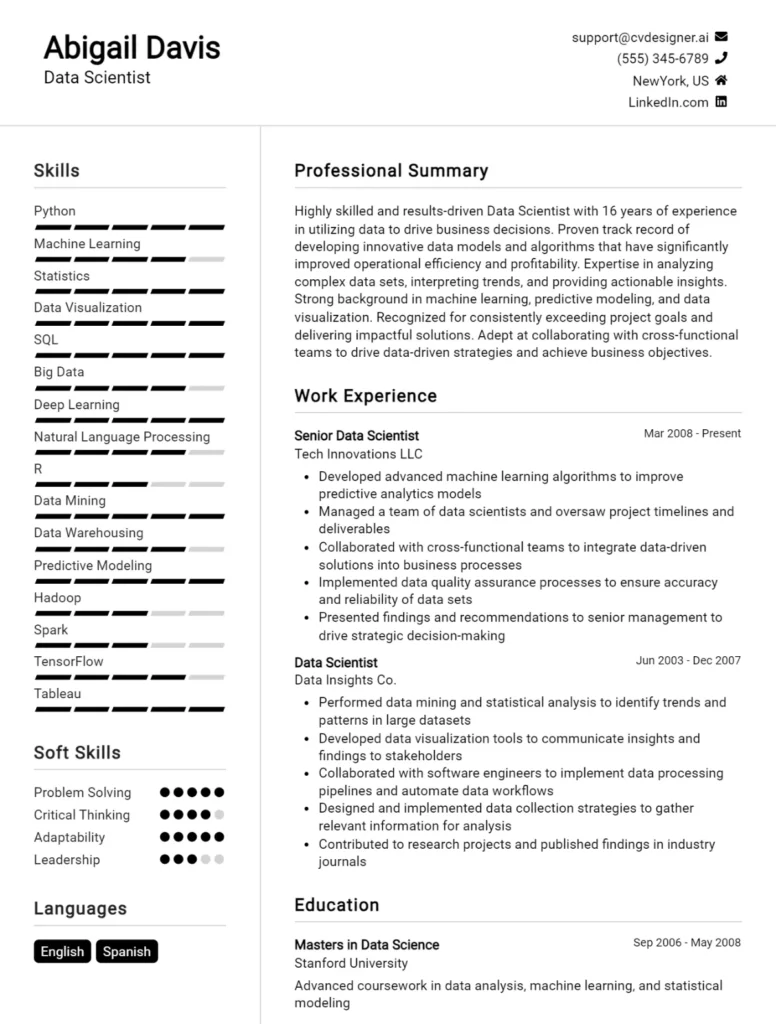Most Popular Machine Learning CV Examples
Explore additional Machine Learning CV samples and guides and see what works for your level of experience or role.
Are you ready to take your career in machine learning to the next level? Crafting an impressive CV is your first step toward landing that coveted position in this rapidly evolving field. In this comprehensive guide, we'll explore the essential elements of a standout machine learning CV. You'll discover how to effectively showcase your technical skills, relevant experience, and project accomplishments in a way that captures the attention of hiring managers. To help you navigate this process, we’ll cover:
- Key components of a machine learning CV: Learn what sections to include and how to format your CV for maximum impact.
- Technical skills: Identify the most sought-after skills in machine learning and how to present them effectively.
- Project showcase: Tips on highlighting your projects, research, and contributions to demonstrate your expertise.
- Tailoring your CV: Understand the importance of customizing your CV for specific job applications.
- Common pitfalls: Avoid the mistakes that can undermine your chances of getting noticed.
By the end of this guide, you'll have a clear roadmap to create a compelling CV that stands out in the competitive machine learning job market. Let’s dive in!
What is a Machine Learning CV?
A Machine Learning CV is a specialized document that outlines a candidate's skills, experiences, and accomplishments related to the field of machine learning. This type of CV typically highlights technical proficiencies such as programming languages (like Python or R), familiarity with machine learning frameworks (like TensorFlow or PyTorch), and any relevant projects or research that demonstrate the candidate's ability to apply machine learning concepts in real-world scenarios. Crafting an effective CV is crucial, as it serves as the first impression for potential employers, showcasing not only technical expertise but also the ability to communicate complex ideas clearly.
The importance of a well-structured Machine Learning CV cannot be overstated; it acts as a key tool in the competitive job market. A strong CV allows candidates to stand out by highlighting their unique qualifications and relevant experiences, ultimately increasing their chances of landing interviews. For those looking to create an impressive CV, following a detailed cv writing guide can be incredibly helpful. Additionally, utilizing a cv maker can streamline the process, ensuring that the formatting and presentation of the document are professional and appealing to hiring managers.
Key Components of a Machine Learning CV
- Contact Information: Include your full name, phone number, email address, and LinkedIn profile or personal website.
- Professional Summary: A brief overview of your experience, skills, and career goals specific to machine learning.
- Education: List your degrees, institutions, and graduation dates, emphasizing any coursework related to machine learning or data science.
- Technical Skills: Highlight relevant skills such as programming languages (Python, R), machine learning frameworks (TensorFlow, PyTorch), and tools (scikit-learn, Keras).
- Certifications: Include any relevant certifications such as those from Coursera, edX, or specialized machine learning boot camps.
- Work Experience: Detail your work experience in machine learning roles, focusing on projects, responsibilities, and achievements.
- Projects: Showcase significant machine learning projects, including your role, technologies used, and results achieved.
- Publications: List any research papers, articles, or contributions to conferences relevant to machine learning.
- Awards and Honors: Mention any recognitions or awards received in your academic or professional career related to data science or machine learning.
- Professional Affiliations: Include memberships in relevant organizations such as IEEE, ACM, or local data science groups.
- Soft Skills: Highlight essential soft skills such as problem-solving, teamwork, and communication that are critical in machine learning environments.
- References: Optionally, provide references or state that they are available upon request.
Sample Machine Learning CV for Inspiration
John Doe
123 Machine Learning Ave
Tech City, ST 12345
(123) 456-7890
john.doe@email.com
LinkedIn: linkedin.com/in/johndoe
GitHub: github.com/johndoe
Professional Summary
Detail-oriented Machine Learning Engineer with over 5 years of experience in designing, implementing, and optimizing machine learning models for various applications. Proficient in Python, TensorFlow, and Scikit-learn, with a strong background in data analytics and software engineering. Adept at collaborating with cross-functional teams to deliver innovative solutions that drive business outcomes. Committed to continuous learning and applying the latest advancements in AI and machine learning.
Work Experience
Machine Learning Engineer
Tech Innovations Inc., Tech City, ST
June 2020 - Present
- Developed and deployed machine learning models that improved prediction accuracy by 30% in sales forecasting.
- Collaborated with data scientists and software engineers to design an end-to-end ML pipeline for customer segmentation analysis.
- Spearheaded the optimization of data preprocessing techniques, reducing model training time by 25%.
- Conducted A/B testing and performance tuning to enhance model robustness and reliability.
Data Scientist
Smart Analytics Corp., Tech City, ST
January 2018 - May 2020
- Analyzed large datasets using Python and SQL to extract actionable insights for business strategy.
- Built various machine learning models, including regression, clustering, and classification, leading to a 20% increase in customer retention rates.
- Presented findings to stakeholders through clear visualizations and reports, facilitating data-driven decision-making.
- Implemented automated data collection processes, increasing data availability and consistency for analysis.
Junior Machine Learning Engineer
AI Solutions Ltd., Tech City, ST
August 2016 - December 2017
- Assisted in the development of predictive models for fraud detection, achieving a 15% reduction in false positives.
- Contributed to the integration of machine learning algorithms into existing software products, enhancing functionality.
- Participated in code reviews and collaborated with senior engineers to improve code quality and maintainability.
Education
Master of Science in Computer Science
University of Tech City, Tech City, ST
Graduated: May 2016
Bachelor of Science in Mathematics
University of Tech City, Tech City, ST
Graduated: May 2014
Skills
- Programming Languages: Python, R, Java
- Machine Learning Frameworks: TensorFlow, Keras, Scikit-learn
- Data Manipulation & Analysis: Pandas, NumPy, SQL
- Visualization Tools: Matplotlib, Seaborn, Tableau
- Cloud Platforms: AWS, Azure
- Version Control: Git, GitHub
- Strong understanding of algorithms, data structures, and statistical analysis
Publications
- Doe, J., & Smith, A. (2022). “Improving Sales Forecasting with Machine Learning Techniques.” Journal of Machine Learning, 15(2), 101-115.
- Doe, J. (2021). “An Exploration of Neural Network Architectures for Time Series Forecasting.” International Conference on Artificial Intelligence, 203-210.
Certifications
- Certified Machine Learning Specialist (CMS), Machine Learning Academy, 2021
- AWS Certified Data Analytics – Specialty, Amazon Web Services, 2022
- TensorFlow Developer Certificate, TensorFlow Institute, 2023
Professional Affiliations
- Member, Association for Computing Machinery (ACM)
- Member, IEEE Computational Intelligence Society
Machine Learning CV Writing Tips
When crafting a CV for a Machine Learning role, it's essential to highlight both your technical skills and relevant experience in a clear and concise manner. Tailor your CV to the specific job description by emphasizing the skills and projects that align most closely with the requirements of the position. Use quantifiable achievements to demonstrate your impact in previous roles, and don’t forget to include any relevant coursework, certifications, or contributions to open-source projects. A well-structured CV that showcases your knowledge of machine learning concepts, tools, and frameworks will make a strong impression on potential employers.
CV Writing Tips for Machine Learning Roles:
- Highlight Technical Skills: Clearly list your proficiency in programming languages (e.g., Python, R, Java) and frameworks (e.g., TensorFlow, PyTorch, Scikit-learn) in a dedicated section.
- Showcase Relevant Projects: Include a section for projects where you can detail your contributions, methodologies used, and the outcomes achieved. Links to GitHub or personal portfolios can be beneficial.
- Quantify Achievements: Use metrics to demonstrate the impact of your work, such as improvements in model accuracy or reductions in processing time.
- Detail Education and Certifications: Include your degree(s), relevant coursework, and any certifications in machine learning or data science from recognized institutions.
- Include Soft Skills: Highlight skills such as problem-solving, collaboration, and communication, which are crucial in multidisciplinary teams.
- Tailor for Each Application: Customize your CV for each job application by aligning your skills and experiences with the specific requirements of the role.
- Use Clear and Professional Formatting: Keep your CV organized with clear headings, bullet points, and a professional font to enhance readability.
- Proofread for Errors: Ensure there are no spelling or grammatical mistakes, as attention to detail is critical in technical roles.
Machine Learning CV Summary Examples
As a Machine Learning professional, having a compelling CV summary is crucial for capturing the attention of hiring managers. A well-crafted summary highlights your skills, experience, and passion for the field, setting the stage for the rest of your CV. Here are some effective CV summary examples tailored for a Machine Learning role:
Results-driven Machine Learning Engineer with over 5 years of experience in developing and deploying predictive models. Proficient in Python, TensorFlow, and data visualization tools, with a strong foundation in statistical analysis and algorithm development. Passionate about leveraging data to solve complex problems and improve business outcomes.
Dedicated Machine Learning Researcher with a Ph.D. in Computer Science and extensive experience in natural language processing and computer vision. Skilled in designing innovative algorithms and conducting experiments that advance state-of-the-art technologies. Committed to the ethical application of AI and machine learning to create impactful solutions.
Experienced Data Scientist with a focus on machine learning and big data analytics. Proven track record of transforming raw data into actionable insights using advanced statistical techniques and machine learning models. Adept at collaborating with cross-functional teams to drive data-driven decision-making and enhance product performance.
Dynamic Machine Learning Specialist with a strong background in software development and a deep understanding of machine learning frameworks. Expertise in building scalable models for real-time data processing and predictive analytics. Enthusiastic about continuous learning and applying the latest advancements in AI to create innovative solutions.
Innovative Machine Learning Analyst with a strong analytical mindset and a passion for extracting meaningful patterns from complex datasets. Experienced in implementing machine learning algorithms and optimizing model performance. Skilled at communicating technical concepts to non-technical stakeholders and driving insights that inform strategic decisions.
Build a Strong Experience Section for Your Machine Learning CV
When crafting the experience section of your Machine Learning CV, it's essential to highlight relevant projects, skills, and accomplishments that showcase your expertise in the field. Focus on quantifiable results and the impact of your work, as well as the technologies and methodologies you employed. Below are examples of strong work experience descriptions that can enhance your CV.
- Developed and implemented a predictive model using supervised learning techniques, leading to a 25% increase in sales forecasting accuracy for a major retail client. Utilized Python and libraries such as scikit-learn and TensorFlow.
- Collaborated with cross-functional teams to design and deploy a machine learning pipeline for real-time fraud detection, reducing false positives by 40% and increasing detection rates by 30%, utilizing Apache Spark and AWS.
- Conducted exploratory data analysis and feature engineering on large datasets, resulting in improved model performance and insights that informed product development decisions, employing tools such as Pandas and Matplotlib.
- Led a project to optimize a recommendation system using collaborative filtering techniques, improving user engagement metrics by 15% and enhancing customer satisfaction ratings, implemented in a production environment using Keras.
- Designed and executed A/B testing frameworks for machine learning algorithms, providing actionable insights that guided marketing strategies and improved conversion rates by 20%, leveraging statistical analysis and Python.
- Developed a natural language processing (NLP) model to analyze customer feedback, identifying key sentiment trends that influenced product adjustments and marketing campaigns, using techniques like sentiment analysis and topic modeling in NLTK.
- Spearheaded the migration of legacy machine learning models to a cloud-based infrastructure, resulting in a 50% reduction in processing time and enhanced scalability for future projects, utilizing Google Cloud Platform.
- Presented research findings on the effectiveness of various machine learning algorithms at industry conferences, contributing to the organization's thought leadership and establishing strong professional networks within the data science community.
Machine Learning CV Education Examples
In the rapidly evolving field of machine learning, a strong educational background is essential for aspiring professionals. Candidates often come from a variety of academic disciplines, equipping them with the necessary skills to tackle complex problems and develop innovative solutions. Below are some examples of educational backgrounds that are particularly relevant to a career in machine learning:
- Bachelor’s Degree in Computer Science: This foundational degree covers essential programming skills, algorithms, and data structures, providing a solid base for understanding machine learning frameworks.
- Master’s Degree in Data Science: A specialized program that focuses on statistical methods, data analysis, and machine learning techniques, preparing graduates to handle large datasets and derive meaningful insights.
- Ph.D. in Artificial Intelligence: Advanced research-focused degrees that delve into cutting-edge machine learning theories and applications, often involving substantial original research and contributions to the field.
- Bachelor’s Degree in Mathematics or Statistics: A strong mathematical foundation is crucial for understanding the theoretical aspects of machine learning algorithms, including probability, linear algebra, and optimization.
- Online Certifications in Machine Learning: Many professionals enhance their credentials through online courses offered by reputable institutions, covering various machine learning frameworks, tools, and practical applications.
Skills to Highlight in Your Machine Learning CV
In the rapidly evolving field of machine learning, showcasing a diverse skill set is crucial for standing out to potential employers. A compelling CV should highlight both hard and soft skills that demonstrate technical proficiency and the ability to work collaboratively in teams. Here’s a breakdown of essential skills to include in your machine learning resume.
Soft Skills:
- Problem-solving: Ability to approach complex issues with analytical thinking and creativity.
- Communication: Proficient in conveying technical concepts to non-technical stakeholders.
- Teamwork: Experience working collaboratively with cross-functional teams to achieve common goals.
- Adaptability: Comfortable adjusting to new tools, technologies, and methodologies as they emerge.
- Critical thinking: Skill in evaluating data and methodologies to make informed decisions.
- Time management: Ability to prioritize tasks effectively and meet project deadlines.
- Attention to detail: Ensuring accuracy in data handling and algorithm implementation.
- Curiosity: A strong desire to learn and explore new developments in machine learning.
- Resilience: Capacity to handle setbacks and challenges in project development.
- Leadership: Experience guiding projects or mentoring junior team members.
Hard Skills:
- Programming languages: Proficiency in Python, R, or Java for developing machine learning models.
- Data manipulation: Expertise in using libraries such as Pandas and NumPy for data preprocessing.
- Machine learning frameworks: Familiarity with TensorFlow, PyTorch, or Scikit-learn for model building.
- Statistical analysis: Strong understanding of statistical methods and their application in machine learning.
- Data visualization: Skills in tools like Matplotlib, Seaborn, or Tableau to represent data insights.
- Deep learning: Knowledge of neural networks and frameworks for advanced model development.
- Natural language processing: Experience with NLP techniques and libraries such as NLTK or SpaCy.
- Cloud computing: Familiarity with cloud platforms like AWS, Azure, or Google Cloud for scalable model deployment.
- Version control: Proficiency in Git for managing code changes and collaboration.
- Model evaluation: Understanding of metrics and techniques for assessing model performance and accuracy.
Machine Learning CV Format
When crafting a CV for a Machine Learning role, it's essential to tailor your document to reflect your experience and skills accurately. The format of your CV can significantly impact how hiring managers perceive your qualifications. Different job levels require different focuses in your CV, from showcasing educational background for entry-level roles to emphasizing project achievements and leadership for senior positions.
For entry-level positions:
- Focus on relevant coursework and projects related to machine learning.
- Highlight internships or any hands-on experience, even if it's academic.
- Include technical skills, particularly in programming languages (Python, R) and tools (TensorFlow, PyTorch).
- Mention participation in hackathons or coding competitions.
- Emphasize soft skills, such as teamwork and communication.
For mid-level positions:
- Detail specific projects with measurable outcomes, such as improved model accuracy or efficiency.
- Include any leadership roles in projects or teams.
- Highlight contributions to open-source projects or publications in relevant journals.
- Showcase a broader range of technical skills, including cloud technologies and big data tools.
- Mention any certifications or additional training in machine learning or data science.
For senior-level positions:
- Focus on strategic contributions and leadership in machine learning initiatives.
- Highlight successful project management experiences and team leadership roles.
- Include metrics that demonstrate your impact on company performance, such as revenue growth or cost reduction.
- Discuss your involvement in shaping machine learning strategies and mentoring junior staff.
- Emphasize your thought leadership, such as speaking engagements or published articles in the field.
For more detailed guidance on structuring your CV, you can refer to this cv format.
Common Mistakes to Avoid in a Machine Learning CV
When applying for a machine learning position, your CV serves as your first impression to potential employers. A well-crafted CV can significantly increase your chances of landing an interview, while common mistakes can overshadow your qualifications and experience. To ensure your CV stands out for the right reasons, avoid the following pitfalls that often plague candidates in the field of machine learning:
- Lack of Tailoring: Submitting a generic CV that doesn’t align with the specific job description or requirements.
- Overloading with Technical Jargon: Using excessive technical language or acronyms without explanation, which can alienate non-technical reviewers.
- Neglecting Soft Skills: Focusing solely on technical skills and failing to highlight essential soft skills like teamwork, communication, and problem-solving.
- Inadequate Project Descriptions: Not providing enough detail about your projects, including your specific contributions, methodologies used, and results achieved.
- Ignoring Relevant Experience: Omitting internships, personal projects, or coursework related to machine learning that could demonstrate your capabilities.
- Poor Formatting: Using an unstructured layout, inconsistent font sizes, or colors that make your CV difficult to read.
- Listing Responsibilities Instead of Achievements: Focusing on job duties instead of quantifiable achievements and results that showcase your impact.
- Using Passive Language: Employing passive voice and weak language that fails to convey your proactivity and initiative.
- Excessive Length: Creating an overly long CV that exceeds two pages; conciseness is key.
- Failure to Update: Not keeping your CV current with your latest skills, projects, and experiences, especially in a rapidly evolving field like machine learning.
Key Takeaways for a Machine Learning CV
- Contact Information: Start with your full name, phone number, email address, and LinkedIn profile. Ensure it's easy for employers to reach you.
- Professional Summary: Write a brief summary that highlights your experience in machine learning, key skills, and what you bring to the table. Tailor this to the specific job you are applying for.
- Technical Skills: List relevant programming languages (e.g., Python, R), frameworks (e.g., TensorFlow, PyTorch), and tools (e.g., Jupyter, Git). Be specific about your proficiency level.
- Education: Include your highest degree first, mentioning the institution, degree earned, and graduation year. Highlight any coursework relevant to machine learning.
- Certifications: Mention any relevant certifications (e.g., Google’s Machine Learning Certificate, AWS Certified Machine Learning) that strengthen your qualifications.
- Work Experience: Detail your previous roles in reverse chronological order. Focus on achievements, responsibilities, and the impact of your work, particularly with machine learning projects.
- Projects: Include a section for notable projects where you applied machine learning techniques. Provide context, your role, and the results achieved.
- Publications and Research: If applicable, list any academic papers or significant research contributions related to machine learning.
- Soft Skills: Highlight essential soft skills such as problem-solving, communication, and teamwork, which are crucial for collaboration in machine learning roles.
- Networking and Contributions: Mention any participation in machine learning communities, conferences, or contributions to open-source projects.
- Tailored CV: Customize your CV for each job application to align with the specific requirements outlined in the job description. Consider using cv templates for a professional layout.
- Cover Letter: Complement your CV with a tailored cover letter. Use cover letter templates to help convey your motivation and fit for the role effectively.
- CV Builder: Utilize tools like the cv builder to create a polished and visually appealing CV that stands out to employers.
Build your CV in minutes
Use an AI-powered cv builder and have your cv done in 5 minutes. Just select your template and our software will guide you through the process.
